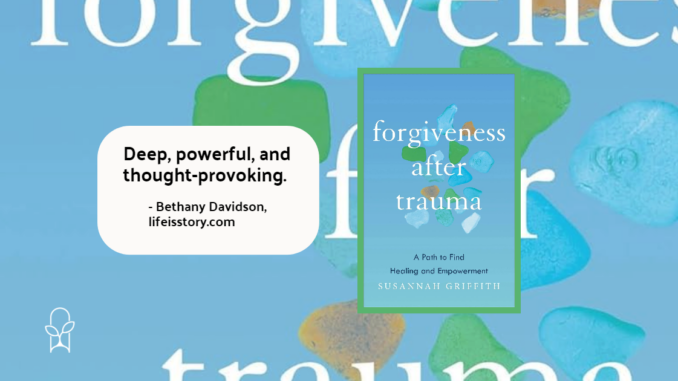
Published by Baker Publishing Group, Brazos Press on March 26, 2024
Genres: Non-Fiction, Christian Life, Memoir, Social Justice, Theology
Buy on Amazon
Goodreads

Susannah Griffith wishes she had spent less time thinking about forgiveness. But as a Christian minister, a biblical scholar, and a survivor of abuse, she has learned a lot about it.
In Forgiveness after Trauma , Griffith explores what the Bible says--and doesn't say--about the biblical call to forgive. She helps readers understand this command in ways that are healing and restorative, framing it within broader concerns around lament, anger, accountability, release and rebirth, and reconciliation.
The result is what Griffith calls "trauma-informed forgiveness," which takes seriously God's forgiveness of sinners while centering survivors of abuse and aiding their healing. This view also empowers those who have been harmed in other ways by abuses of power and justice in religious institutions.
Readers will resonate with Griffith's astute biblical analysis and personal reflection, which point to God's love--a love that never includes abuse and strives for justice for the vulnerable.
This powerful book explores what forgiveness can look like for trauma survivors, without unhealthy pressures to prematurely forgive or return to an abusive situation. Susannah Griffith shares a biblical theology of forgiveness alongside her personal story of surviving domestic violence, and she uses her experiences to illustrate key concepts like biblical lament and righteous anger. She writes about why certain teachings about forgiveness are harmful, shows that the Bible does not support these common tropes, and outlines some lesser-understood implications of biblical teachings about forgiveness.
The author’s background in biblical studies shines here, because she is able to make a clear, well-argued case for what a trauma-informed approach to biblical forgiveness can look like. Although some writers use their personal feelings and experiences as a grid for reinterpreting Scripture, Griffith engages with what the Bible actually teaches, and then integrates this with her own experience. Also, even though Griffith focuses on domestic violence in this book, its message applies to anyone who has experienced interpersonal trauma.
The memoir parts in Forgiveness after Trauma are profound and vulnerable, and although they may be triggering for other domestic violence survivors, Griffith’s story is one that many people need to hear. She dramatizes horrible moments from her marriage, writes about ways that other Christians hurt her through their lack of understanding and bad advice, and portrays the utter vulnerability that she experienced as she tried to reconcile her marriage, faced repeated obstacles, and finally had to let it go. She also shows how some Christian friends were able to support and care for her well, and their example can encourage people who are trying to help loved ones in abusive situations.
Griffith also includes some thoughts about surviving sexual abuse when she was younger, but this is relatively brief, and she does not include specific details about what happened. This book’s triggering content is specifically about domestic violence, and I would encourage people with similar trauma histories to approach this book with caution, even though it can be very healing if they are emotionally ready for it. Griffith portrays her personal story in an incredibly nuanced, insightful way, especially as she grapples with the tension that she felt between her terror of her husband and the genuine love they had shared. Her reflections can help validate the complex experiences of other survivors, and will help outsiders understand how profoundly complex these situations often are.
However, I think that this book would be even stronger if the author had included more examples from outside her own life. There’s so much to unpack about her experiences that I understand why she focused on them alone, but her story is just one example of domestic violence, and it is also a clearer-cut example, since it involved repeated physical assaults, death threats, and suicidal threats. My concern is that some readers may focus on the more extreme elements of her story, without understanding that domestic violence doesn’t always involve physical harm. Griffith never says anything to undermine the experiences of emotional abuse survivors, but I think that this book would be even more powerful and helpful if she had included examples that show that other forms of abuse without physical violence are also trauma, and may also require separation and divorce.
Forgiveness after Trauma: A Path to Find Healing and Empowerment is a powerful, thought-provoking book that combines Scriptural teaching with personal narrative. Griffith engages with Scripture to build a stronger, more accurate vision of what true forgiveness looks like, and what God does not require. Her clear, insightful teaching will help people who are struggling with forgiveness in a variety of different situations, and her personal narrative will help people who are dealing with domestic abuse or who want to better understand it. I appreciate the author’s spiritual depth, honesty, and insight, and highly recommend this book.
